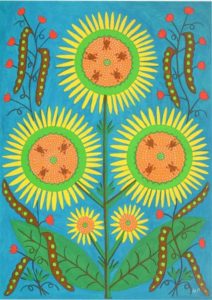
Dear Friends, I Give You the Sun and My Sunny Art by Maria Primachenko
by Leza Lowitz
When I was growing up in Berkeley, California, I often passed “free boxes” set randomly on the streets. These were collections of clothes, books, and household items people put out when they had finished using them. Others came and took what they needed, often depositing their own no-longer needed items. I found many a treasure in such boxes, and I left many a treasure behind.
Berkeley, California, is no doubt one of the most progressive places on the planet. When I moved to Japan, one of the most ancient and change-resistant countries in the world, the contrast couldn’t have been greater. My husband is Japanese, and I’d lived in Japan before, so I knew what I was getting into. I felt called to share yoga, and that’s what I did in 2003, when I opened a yoga studio in Tokyo. My idea was to provide a haven for the megacity’s workaholics with a laid-back California vibe, a place where people could practice yoga and meditation, learn about wellness and spirituality, and be in community with others.
I wanted to keep things low-tech and simple. We had paper sign-in sheets that are filled in by—wait for it—pen! If people didn’t have money for classes, they could come for free. If they had a skill they wanted to barter, they could trade. Many people were surprised by this and commented that it didn’t make good business sense. But to me, it made perfect sense.
We also started weekly Community Classes for charity shortly after we opened. When I told people about my plan to do this, some replied that the Japanese would never attend charity classes, because if something wasn’t expensive, they believed it didn’t have value. They argued that there was no tradition of charity in Japan, which I didn’t believe, and anyway, I didn’t listen. The class is really popular, and people feel good that they can support local charities and enjoy their yoga, too. Over the years we have supported schools, helped communities rebuild through disaster relief, and contributed to hundreds of worthy causes. Now, there are many charity yoga classes offered in yoga studios throughout Japan, helping local and international causes. This is the root of yoga—seva, or service. It is important to model that yoga is not just asana postures.
The importance in yoga of giving is nothing new. Dana (generosity) is one of the 10 niyamas in the Hatha Yoga Pradipika, the Yoga Yajnavalkya, and other yogic texts, and it is the first of the Ten Paramitas —“Perfections” or Skillful Qualities in the Buddhist tradition. Everything begins from dana, as practicing generosity cultivates selflessness and underscores our innate interconnectedness. It also fosters non-attachment, countering our tendency towards grasping and greed. In the eight limbs of yoga in the Yoga Sutras, aparigraha (non-attachment) is one of the five yamas that form the foundation of the yogic system.
In this spirit, another thing our studio did was to have potluck ceremonies to mark anniversaries or holidays. In Japan, holiday parties are usually expensive affairs, catered and held at fancy rental spaces. A potlatch is a gift-giving festival and primary economic system first practiced by indigenous peoples of the Pacific Northwest Coast of Canada and United States. The word has its origins in the Nuu-chah-nulth word for making a ceremonial gift. At potlatch gatherings, a family or hereditary leader hosted guests in their home, holding a feast. The main purpose of the potlatch was originally the re-distribution and reciprocity of wealth. Gift-giving of dried foods, sugar, flour, money or other material things also occurred. Spiritual ceremonies, singing and dancing also marked the occasion. The modern potluck ceremony, where guests bring food and drink to share with others, derives from this custom. Over the years, it was a joy to see how much people enjoyed coming out of the woodwork to share their various talents of dance, singing, and cooking, sharing their offerings with others. One man even bought a camping stove and brewed his own coffee in the middle of the room. It’s always a nice surprise to experience people beyond their yoga practice. At these gatherings, people feel seen and appreciated. This is a huge gift.
In his 1979 classic The Gift, Lewis Hyde posits that “the gift is an object that must continuously circulate throughout a society in order to keep its gift qualities.” Hyde also addresses the issue of the gift of art within a market-dominated society. He argues that when a primarily gift-based economy is turned into a commodity-based economy, “the social fabric of the group is invariably destroyed.”
In the boom years of the 1980s, Western society became increasingly material and wealth-obsessed. Japan followed suit. Both could be said to be commodity-based economies. Now, high tech and social media have made us “busier than ever” and more focused on external “gains” and perceived “success.” Stress and discontent are on the rise. So much of our dis-ease comes from being disconnected to ourselves, and to others. In the age of social media, it is important to resist the trend to monetize our relationships, to “funnel” followers and make every interaction a transaction.
The things we never see on social media: I can’t count how many times I stayed after class over the years, listening to a student talk about their lives and offering support. I can’t count how many times people thanked me for being there for them when they needed me. These times made me aware of the precious gift of listening. And when it came time for me to need support, my community was there because we had sewn the threads of compassion and care. Giving and receiving are a two-way street. Giving is living.
Giving can help us restore balance and enjoyment in life. It’s something to think about when we feel disconnected. Can we give of our time, our energy, our resources? Can we be a mentor, a guide, a listener? Doing so is a great gift to the communities in which we live. This blog you are reading is such a gift, created from the time, effort and energy of Nina Zolotow and many other people volunteering their talents. Though it might sound counter-intuitive, giving is receiving. It is also important to be aware of our mental state when giving. Are we giving in the spirit of generosity?
Taking time to express gratitude, to remember all the things we are grateful for in our lives, is to see them for the gifts they are. This a beautiful practice of mindful recognition and a great way to nurture wellness, balance, and inter-being. This holiday season, we can give such gifts freely and joyfully to ourselves and others.
You can read more about Leza’s writing at www.lezalowitz.com and about her yoga studio and classes at www.sunandmoon.jp.
Follow Yoga for Healthy Aging on Facebook ° To order Yoga for Healthy Aging: A Guide to Lifelong Well-Being, go to Amazon, Shambhala, Indie Bound or your local bookstore.


Leave A Comment